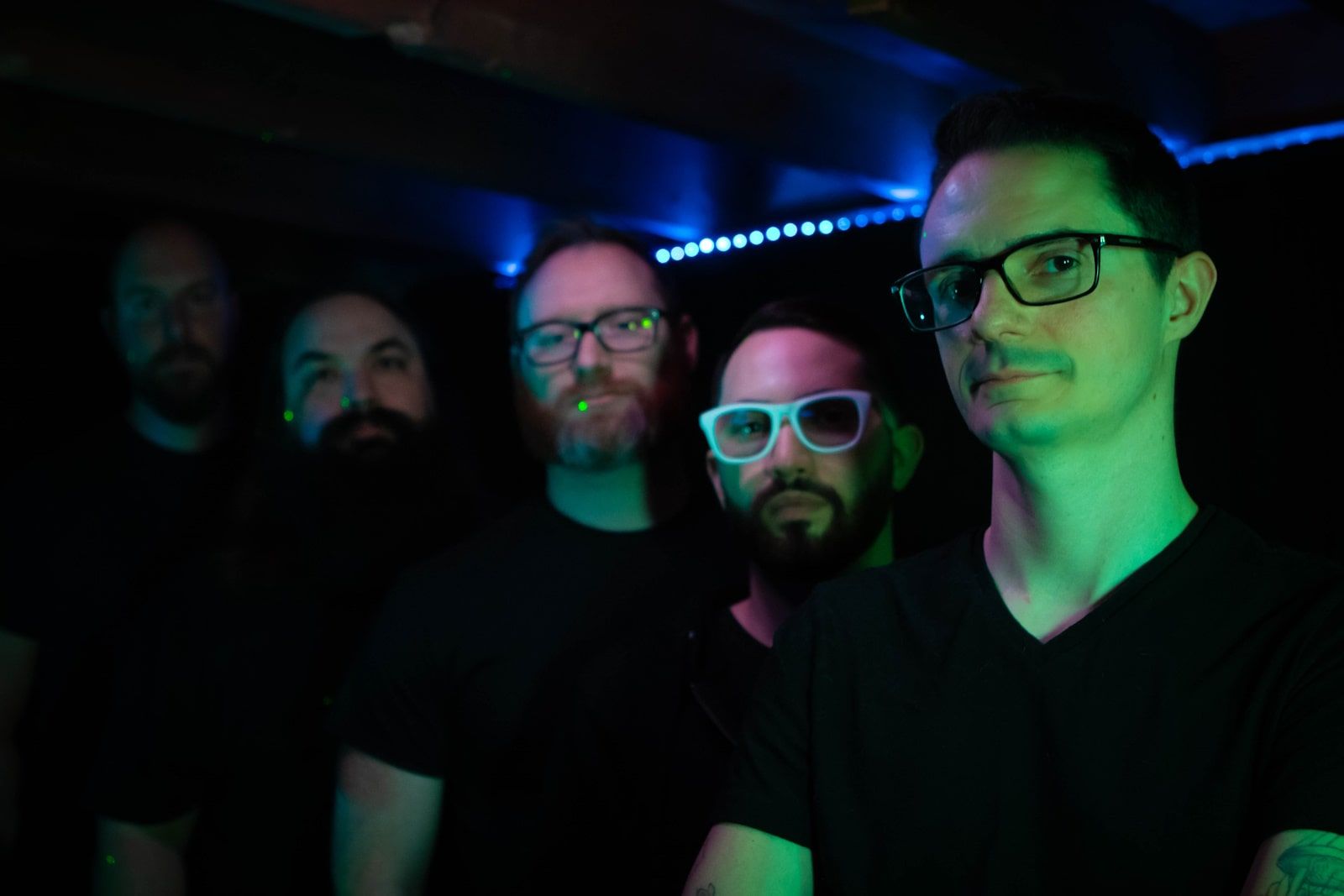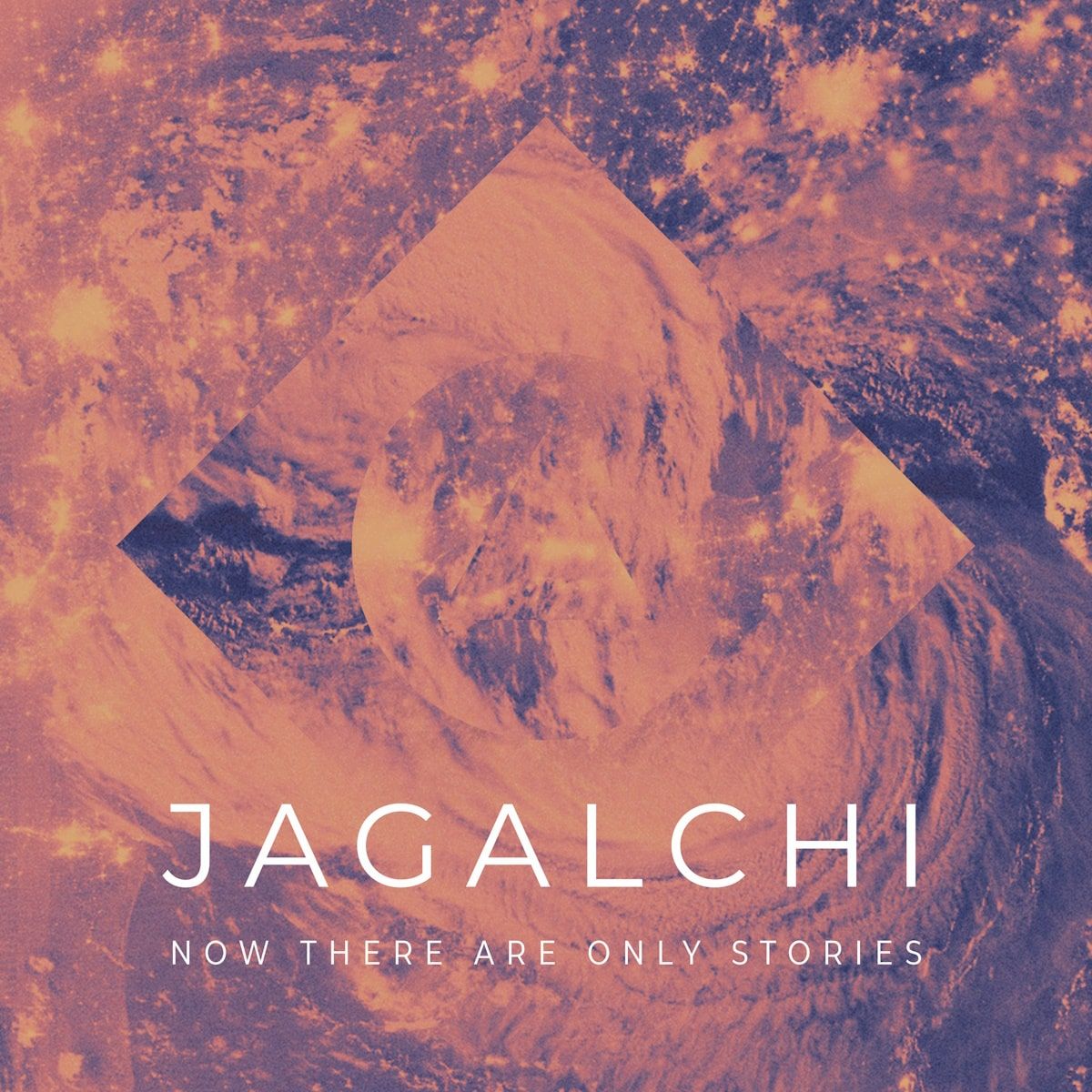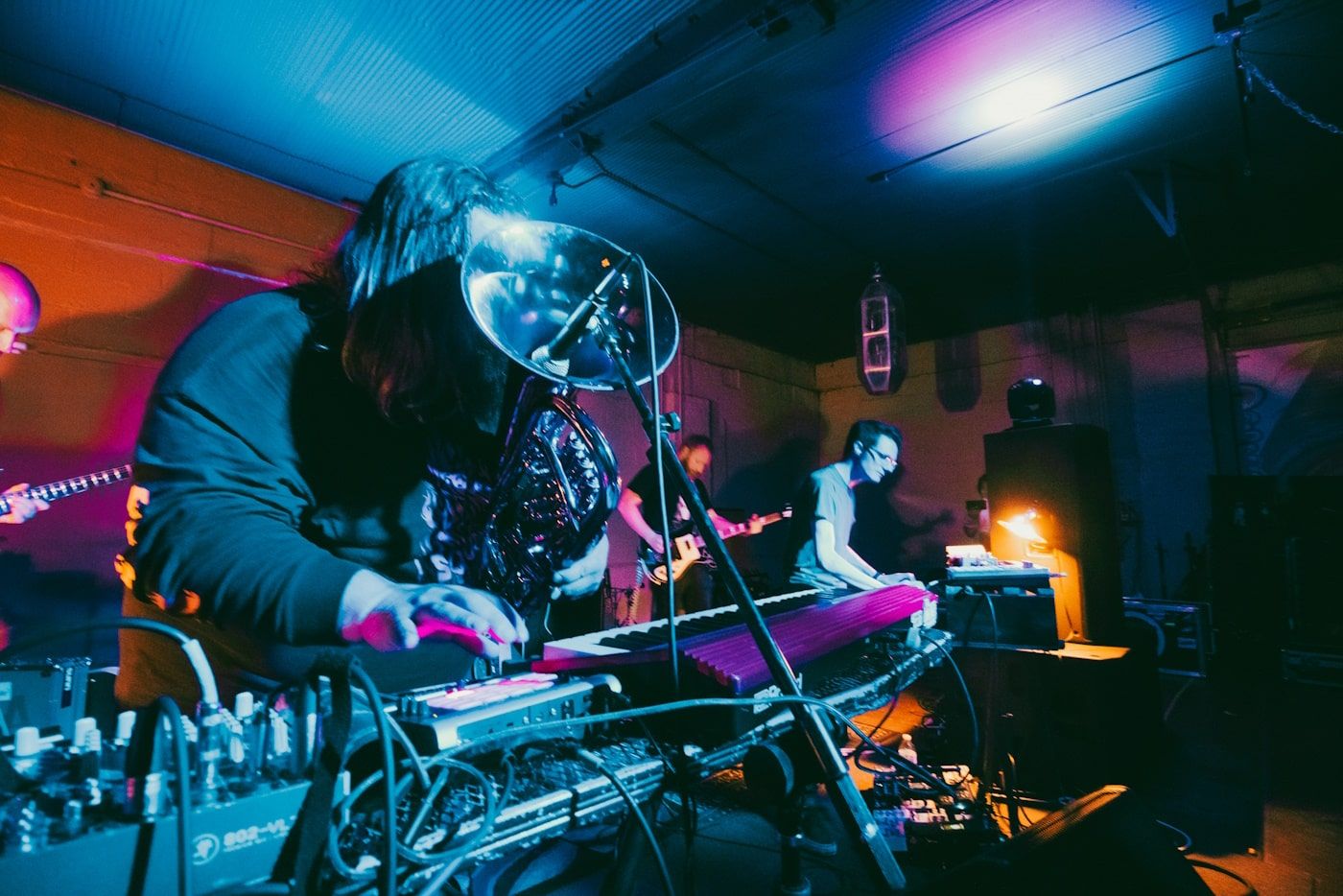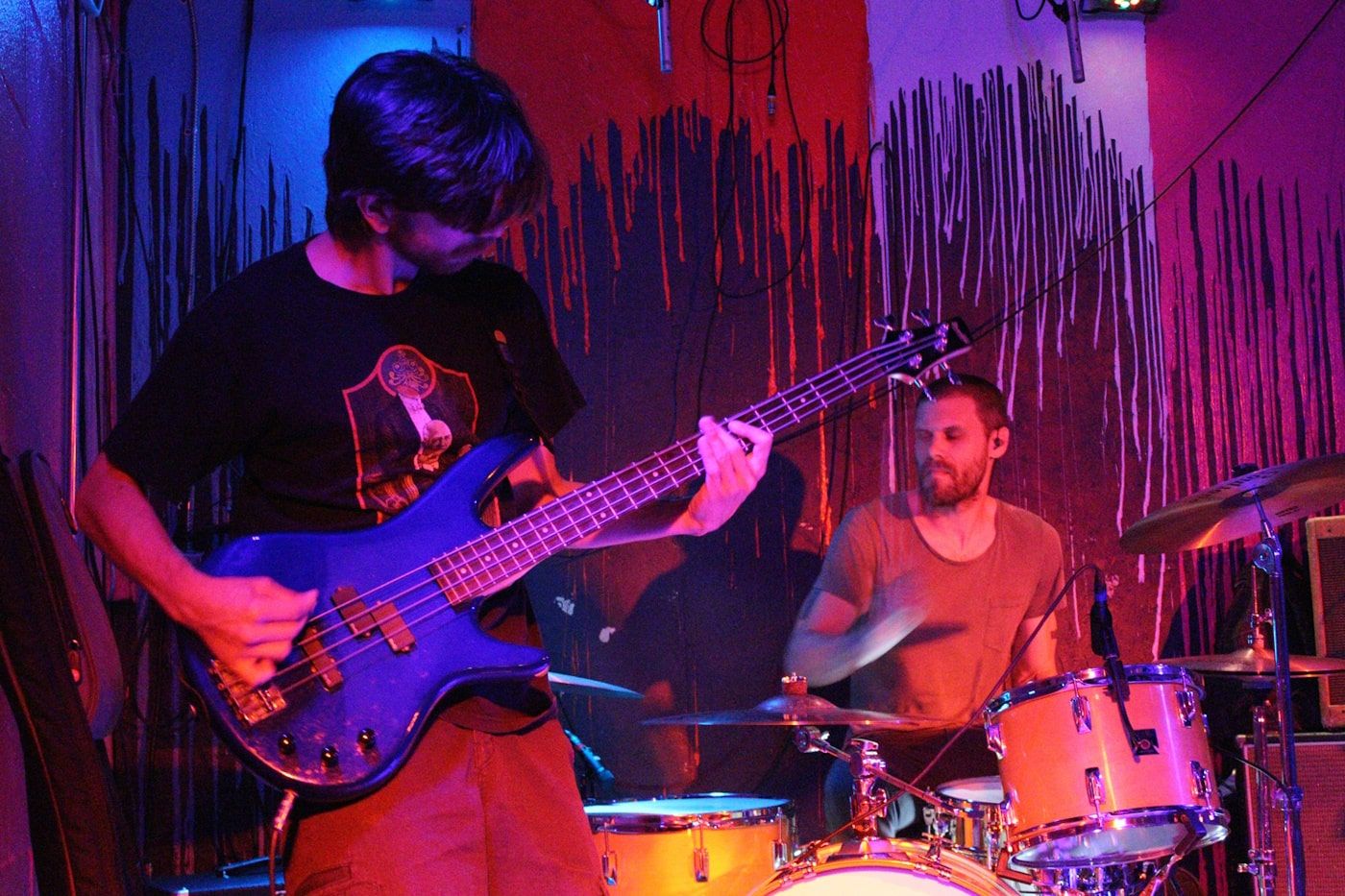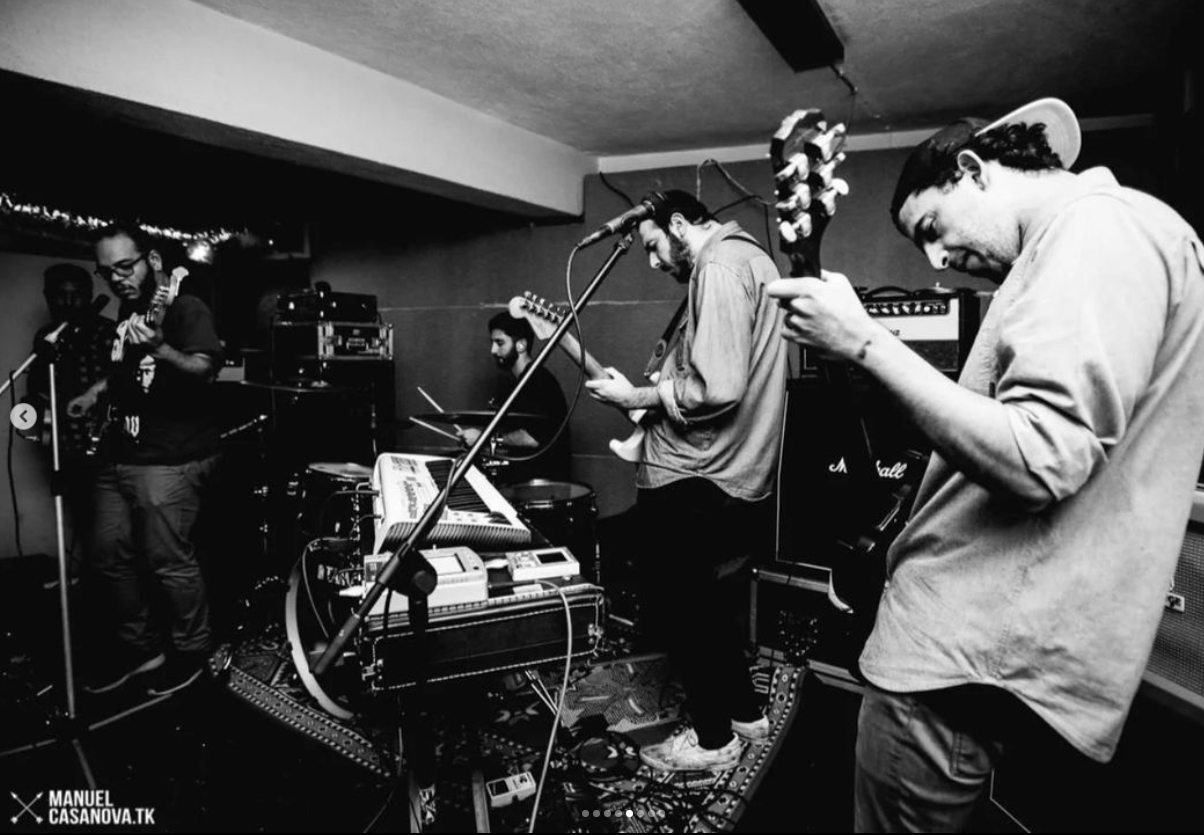The Indiana-based band’s sound — comprising horn sections, bass, guitar and keys—strikes with post-big band eclecticism, each track interwoven with the complex songwriting of Andrew Kallicragas (Locktender, Men As Trees, Pack Sounds) and Russ Wagner’s curated spoken word samples. These vignettes tell fragmented stories of climate collapse, societal disarray, and resilience, pulled from short fiction and literary excerpts that capture the essence of post-apocalyptic existence.
JAGALCHI’s debut album, Now There Are Only Stories, offers an intricate, genre-defying journey, merging post-rock, samples, and avant-garde storytelling to mirror our collapsing world, and today we’re honored to give you a stellar journey into each and every track from this epic offering.
This album is built on influences both cosmic and personal. The band’s namesake, Jagalchi, nods to a famed fish market in Busan, South Korea, symbolizing life at the edge of ruin. This theme crystallizes through the album’s unique approach to narration, where ambient soundscapes break traditional structure, forcing listeners to confront the layered narrative as if piecing together remnants of history.
The opener, “Grasp Your Trials,” introduces Caroline Bissonnette’s readings, setting a dystopian tone that flows into the album’s core. Samples and minimalistic vocals intertwine, giving a raw immediacy to the struggle for survival. Thematically, the album unfolds through tracks like “After the Big Wave” and “Before the Hunters Became the Hunted,” exploring the chaos post-catastrophe. Here, manipulated samples mirror dissonant riffs, amplifying the themes of upheaval and loss.
The suite Of Paucity and Pestilence serves as the album’s pinnacle, split into four movements to ease listeners into its dense 23-minute runtime. Each part—layered with spoken word excerpts from Ursula K. Le Guin and original narratives—highlights societal collapse, especially resonant in “The Long Drought” and “A Shimmering Fantasy in the Depths of the Desert“. For the album’s finale, “Locking Season” reflects on existential finality, with Vonnegut-inspired ambient sounds tying the narrative to an ominous conclusion.
With a live tour in the works, JAGALCHI’s sophomore album promises to delve deeper into Midwest emo and chaotic math rock, widening their experimental scope.
JAGALCHI will record a second LP in January 2025 and support its release with shows around the Midwest and a US/CANADA East Coast tour this summer. “We get a lot mathier / Midwest emo on our next lp” – teases the band.
Here’s the full track by track commentary by Russ Wagner (Jagalchi, Reptilian, Pack Sounds):
Grasp Your Trials
I became friends with Caroline Bissonnette after being tear-gassed by police during a protest in the Summer of 2020. Recovery from that incident led to a very late night and many porch drinks, and eventually gave rise to Caroline showing me a set of short fiction stories she had written about characters experiencing everyday life in a time after global climate collapse. Jagalchi had just begun writing music together, and we had this idea to approach post-rock songwriting with unconventional lead instrumentation in mind. At this time of great social upheaval, in the middle of a worldwide pandemic, it felt like the universe was showing me something very specific. I asked Caroline if she would let me record her reading these stories she had written for the sake of a musical project. That would eventually become the basis for the whole concept of Now There Are Only Stories.
As we searched for a meaningful title that summed up the storytelling nature of the album in an evocative way, we came back to that first sampled line that opens this track. It wasn’t until very near the end of the recording and mixing process that it dawned on us how perfect it really was.
Finding places to deploy these bits of sampled readings throughout the record was very specifically thought out. I wanted to use this element as a way to create an overarching narrative that was broken up and scattered across the album’s tracks in a way that would allow listeners to feel like they were piecing together history through discovering old transmissions. Though there were times that I wanted to place more samples on the album, I like that only a short one ended up making it onto this track. I think that mirrors nicely the fact that this song is also the only time we feature any sung vocals on the album, and both parts kind of book-end the song. Scott’s lyrics at the end, in my interpretation, reflect the idea of holding onto whatever you can, and deciding what is truly most important to you as things fall apart. It felt like another voice telling a different perspective in the album’s world. More on that idea later.
After the Big Wave
Now here we get into a lot more of the sampled readings. While Grasp Your Trials serves as the intro to the album and, in a way, establishes the themes that will be explored, After the Big Wave starts to dig into the specifics of how our characters experience day-to-day life. The original title of this piece of writing is ‘A Sunlight Story.’ There is a real element of collage that went into deciding how to cut up the recorded material I was given and shape it into the narrative of this album.
I want to further highlight the cosmic happenstance at the core of coming across this writing. We had decided to call our band Jagalchi, named after a world famous fish market in Busan, South Korea. It was a suggestion based on the experiences of how our band members Scott and Andrew had met, while teaching English in South Korea. Though Andrew and I are long-time friends, I likely never would have met Scott if it were not for this chance meeting. Scott was then the gateway for us meeting our other bandmates Tyrus and Nic. We had just settled on this band name… then I was presented with this story of two characters hauling in crabs for a small, coastal society in the wake of a tsunami. It all felt too connected to ignore.
Before the Hunters Became the Hunted
This song is certainly the most energetic and aggressive on the record, so it made sense to give it a title and allocate samples that fit accordingly. We continue with the fishing motif here, but there is a sense of menace that comes on within this track. The allegory on display here deals with the order of things being toppled over after a seismic disruption to life as we know it.
Between Mike Schuur, our recording engineer, and Jordan Wagel, our mixing engineer, we got to do some fun things with sample manipulation on this song. I sample all of these parts live and run them through my effects pedals, so there are lots of ways I like to distort and twist the spoken word sections at times. I really got to go town with the delay oscillation on this one, turning the recorded dialogue into pure noise at some points. Though it isn’t super prominent in the mix, it’s maybe the most chaotic things get on the album. Our engineers really did a great job of taking that, reigning it in, and making sure it stayed musical.
Of Paucity and Pestilence: I. The Plague Years of the 80’s
Of Paucity and Pestilence is a song that we conceptualized as a whole 23-minute piece. We broke it up into four different movements for the album because:
A) I am a sucker for long-winded, indulgent post-rock song titles that contain all kinds of punctuation,
B) it would likely be easier to digest as a listener, and
C) it would also be easier for us to record in four separate chunks.
…but also [D) not only am I a sucker for long titles and punctuation, but I also love a good sequence of things]
This movement features a different reader. I brought in my good friend Ina Foster-Goodrich to read an excerpt from the 1971 Ursula K. Le Guin novel The Lathe of Heaven. Their take was so spot on and haunting. I don’t know if we did more than one take. Caroline had recommended this book to me later on in 2020 and, continuing with the theme of serendipitous circumstances, the apocalyptic nature of the novel perfectly dovetailed with the themes we had already been exploring for this record. This was also a point where I began to run out of all-original material that I could pull from. I began to expand the scope of the narrative in a way that felt natural: to include more voices and more sources of narrative in a way that further informed the theme of multiple stories being told by different people experiencing life in a post-climate apocalypse world.
Of Paucity and Pestilence: II. The Long Drought
This might be the most ‘post-rock’ song on the album. Here we get back into another original composition by Caroline. This particular story was my favorite one, and I feel like it hits me so hard every time I hear her voice read it back. I originally wanted this story to be the entirety of this last song, but the limit of the recorded material I had to work with and the 23-minute run-time of the song were at odds with each other. We had decided we wanted something to begin the first movement, and we would later need something else for the final movement, which was actually a very late addition to the album. We’ll touch on that in a bit. So the story about drought ended up comprising the middle two movements.
I love how this worked out in the end, though. A narrative dilemma ends up creating a space for a wider context to be given to a long piece of music, thus gives way to a larger story about various states of scarcity.
Of Paucity and Pestilence: III. A Shimmering Fantasy in the Depths of the Desert
No, THIS might be the most ‘post-rock’ song on the album. We continue here with the story of drought; the sprawling, verdant California landscape changing slowly over a lifetime into a harsh, arid desert. I feel the end of this track is one of the most poignant moments on the album. For a long time, we considered this the end of the song, and it would have been how we ended the album altogether…
Of Paucity and Pestilence: IV. Locking Season
At kind of the eleventh hour, Andrew came to us with this idea of what would basically be an ambient noise track that would serve as a coda to the album. I don’t think we even toyed with this as a band before we went into the studio to record the album. I called my good friend Jake Watkins and asked him simply to leave a voicemail on my phone where he read me a passage from his favorite post-apocalyptic book. He responded with this brilliant performance of a passage from the 1963 Kurt Vonnegut novel Cat’s Cradle.
Being able to include other people’s ideas and voices was crucial to constructing a theme and an overarching narrative to Now There Are Only Stories. There are big concepts at work here, and I feel one of my strengths as an artist is curating a concept. I could not personally write or sing big ideas as well as I would like, but I can cultivate and organize ideas across mediums into what I feel like is an intriguing story. I hope this album says something meaningful as we stare down the realities of climate crisis and tyranny across the globe.
Keep in the loop!
🗞️ Subscribe on Substack
🔔 Join our Messenger and WhatsApp
📜 Get daily news via Instagram Stories
Your support keeps us alive!
IDIOTEQ is a one-man DIY operation, tirelessly spotlighting the local cultural scenes and independent bands that often go unreported elsewhere. Born in the early 00s, this platform has been committed to giving hard-working artists the high-quality coverage they truly deserve.
No ads, no distractions—just pure inspiration and a genuine focus on independent artists and their stories.
Please consider helping keep IDIOTEQ ad-free and in tune with the indie scene by donating today.
DONATE via PayPal 𝗈𝗋 SUPPORT via Patreon
100% of the funds collected go toward maintaining and improving this magazine. Every contribution, however big or small, is super valuable.
Your support ensures that we continue to be a place where you can discover, learn, and get inspired, without any advertising noise. Thank you for being a part of this musical journey.




